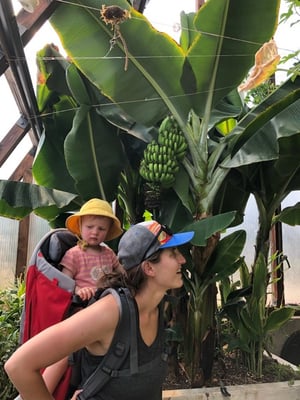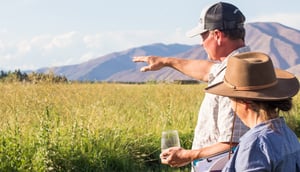Practical Activist Q&A: Lexie Praggastis Executive Director, Sun Valley Institute for Resilience
- Bluestone Staff
- December 4, 2020
Featured image: Lexie Praggastis with her two children, Simon and Amelia
The Sun Valley Institute for Resilience (SVIR) is a catalyst for lasting quality of place, advancing economic, ecological and social resilience by pioneering transformative solutions from their home in central Idaho. SVIR builds social, economic and ecological resilience by connecting capital to community needs, fostering collaboration, raising awareness and serving as a catalyst for change. We had a chance to talk with Lexie Praggastis, SVIR’s Executive Director about their mission, and why resilience is at the core.
Q: Lexie, resilience is in the title of Sun Valley Institute’s name. Talk to us about how resilience informs your mission and what you’re working on?
A: Resilience is a nebulous term that means different things to different people. When we think about resilience, we’re looking at the large systems at play (food, water, energy) and where those systems intersect in our community. Universally, resilience is flexible, dynamic and always changing. On the ground, resilience is place-based…and it needs to be authentic to the community we are serving, so we can meet people where they are. Here in Sun Valley, we are in a ski community that relies on tourism, so we have large economic stratification, and that raises issues of economic equality and affordable housing. In addition, we are dealing with droughts and wildfires while our rural setting makes our energy and food systems fragile. So, when we look at how we can have impact, we are starting with the food system because it is inclusive. Everyone needs to eat. The importance of food systems is that social and economic justice is baked into it as well as environmental impact. One thing I’ve learned about systems thinking and systems change, is that you start by dreaming big and thinking big, and then you take your first steps by asking: where can we begin?
Q: What is the most important thing that you want people to understand about SVIR?
A: Some common misconceptions about Sun Valley Institute for Resilience is that our work mirrors the work of the Aspen Institute or that it is intended to impact only our small county.
The “Resilience” part of our name is important and resilience is unique to each place. We have used this pandemic to better understand our community’s greatest needs and identified opportunities for impact. That’s why addressing the food system, right now, is key for us. Food literally brings people to the table and builds a shared sense of community – a key element of community resilience.
Idahoans have a strong sense of place and we’re reaching out beyond the immediate boundaries of Sun Valley and looking at our larger, regional food shed. Again, because resilience can’t be defined by city or county lines.
Here are just a few examples of what we’re doing to help build community around food. We publish our “locally grown guide" which includes all of our farmers and ranchers – really putting a face to the names. It is a way for people to make that personal connection to their farmer. The guides are both online and distributed for free.
We’ve created a grass-roots community around food production with 5B Resilience Gardens, modeled after the Victory Gardens of the World War II era. It’s about empowering people to grow their own food and cultivating community – from composting to seed preservation.
Our Impact Idaho Fund attracts and mobilizes mission-driven capital. We are in our pilot phase, and we’ve identified three farmers to work with: Itty Bitty Farms, Lookout Farms and Harmony Hens. Itty Bitty Farms is in Carey, Idaho which up until March 2020, was a USDA designated food desert. They became a lifeline during the early months of COVID. Our investment here will help them yield 10,0000 more pounds of food during the next growing season. At Lookout Farms, the Fund will help transition additional acreage from hay to vegetable production and doing it the right way – using 90% less water for example. Harmony Hens is an organic poultry farm. We’re supporting them to build a USDA-inspected processing facility and FDA approved commercial kitchen. This project has so much potential because currently there is not a USDA chicken-processing facility in Southern Idaho. Creating this local resource means better quality meat, a smaller carbon footprint and more humane treatment of the animals.
Q: What drew you to SVIR? How has your MBA in sustainable systems prepared you?
A: I was born here. This is my hometown, so this is an incredible opportunity to live my passion where I was born and raised. This is my community and so many of the people I get to talk to and work with are people that I’ve known forever. Growing up here, you can’t help but have an appreciation for nature because you spend so much time outside. I was a Nordic ski racer, and I think that gives you an environmental lens. Grad school showed me systems thinking at a macro level and the intersection of social and economic impacts. I also learned the importance of financial discipline for nonprofits…as one professor used to say: “You can’t have more mission than money.”
Q: Teaching has been part of your career path so far. Is teaching part of your DNA and how does it inform your work at SVIR?
A: Teaching is about igniting curiosity. You need to be figure out a way to engage students so they can relate and get excited. Resilience is complex and the challenges are monstrous…so how do we communicate the story and invite people into the story and be part of the change? A big part of what we’re doing is meeting people where they are and engaging in conversation. I’ve been a chemistry teacher, a ski coach and a river guide and the thread that ties them all together is about building connection. My goal is to…build community and get people in a room and engage in the conversation. Ultimately, I want everyone to be invited to be part of the solution.
Q: It looks like you’ve had a few adventures so far, from being a river guide to conducting genome research at the National Institutes of Health…what’s been most transformative for you?
A: Parenting has been the most transformative for me for sure – with a two and four-year old! Though parenting is so central to my life right now, these other experiences have all also be powerful and really, it comes down to learning. I just love learning… whether you’re a new parent, on a river or in a lab, you’re learning and you’re going to fail a lot…small and large failures. How can you take what you learn and just reset? How can you use your creativity to apply the lesson and think differently? I never would have thought I was creative until I realized that creativity is about problem solving and reimagining systems. We are all creative! And always have the humility to laugh and take in the lesson!
 Photo Left: Lexie with her daughter learning about regenerative farming practices (and growing bananas) at a farm in Montana.
Photo Left: Lexie with her daughter learning about regenerative farming practices (and growing bananas) at a farm in Montana.
Q: 2020 has been a tumultuous year across the globe. You’re a working Mom with a young family…what are you thinking, hoping or feeling as you look to the future?
A: My hopes and dreams for my family? Are you trying to make me cry? (laughing) I am privileged to raise kids with my husband who is a true partner and we approach it as a team. It wouldn’t be possible without him and my parents are here too – I don’t know how I would have made it without them this last year. This work is emotionally taxing, and then you find yourself having a battle with your toddler about a raisin or whether to wear pants – equally emotionally taxing. (laughing) When I think of my kids, I want to be able to tell them that I worked hard to make this place better. It’s an honor to work in the community that raised me and build a better future for all of us.

Photo left:
SVIR’s program director with a local farmer connecting around shared hopes and dreams in central Idaho.
Q: Do you have a mantra that you live by or a quote that inspires you?
A: The first is a poem I go back to over and over again: The Guest House by Rumi. You can read it through a personal lens if you are going through a tough time and it is really grounding. The second is something I learned during my Wilderness First Responder training when I worked in the back country and this is: “You have to go slow to go fast.” There are moments in the backcountry where things can go south quickly, and you have to focus in on the moment and prioritize on what is most important, so you can move forward. You can’t do everything at once. Go slow to go fast.
Q: Any final thoughts?
A: I love connecting to people and talking about shared hopes and dreams. I believe that connecting each other to those shared hopes and dreams and inviting people into the story is how community resilience begins.
 SVIR is a new nonprofit in the 1% for the Planet network. At Bluestone, we’re a business member of 1% for the Planet. So, your premiums benefit high-impact non-profits like SVIR that are working diligently for positive environmental and social change. We also provide a complimentary additional death benefit which you donate to the nonprofit of your choice.
SVIR is a new nonprofit in the 1% for the Planet network. At Bluestone, we’re a business member of 1% for the Planet. So, your premiums benefit high-impact non-profits like SVIR that are working diligently for positive environmental and social change. We also provide a complimentary additional death benefit which you donate to the nonprofit of your choice.
Bluestone encourages the Practical Activist in all of us to get involved in your community and support organizations like Sun Valley Institute for Resilience.
Like hearing about Practical Activists?
We’ll share their stories with you monthly. (No email overload… we promise!)

